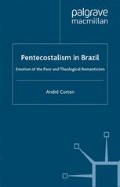Abstract
Liberation theology will remain, for many years to come, an element of the ethico-political field in Latin America. It has not died. Although it is no longer able to broaden mobilization at the base (Burdick, 1993; Comblin et al., 1993; Valle and Pitta, 1994), and although it is no longer the effervescent movement it once was, it remains one of the essential components of social movements. Ana Maria Doimo (1995) distinguishes the ethico-political field from the other trait of social movements: direct action. The ethico-political field is at once a dense network of organizations (including NGOs) and a framework of collective memories and values.
Access this chapter
Tax calculation will be finalised at checkout
Purchases are for personal use only
Preview
Unable to display preview. Download preview PDF.
Author information
Authors and Affiliations
Copyright information
© 1999 André Corten
About this chapter
Cite this chapter
Corten, A. (1999). Participation and the Poor: Liberation Theology. In: Pentecostalism in Brazil. Palgrave Macmillan, London. https://doi.org/10.1057/9780230379176_1
Download citation
DOI: https://doi.org/10.1057/9780230379176_1
Publisher Name: Palgrave Macmillan, London
Print ISBN: 978-1-349-41027-9
Online ISBN: 978-0-230-37917-6
eBook Packages: Palgrave Social & Cultural Studies CollectionSocial Sciences (R0)

